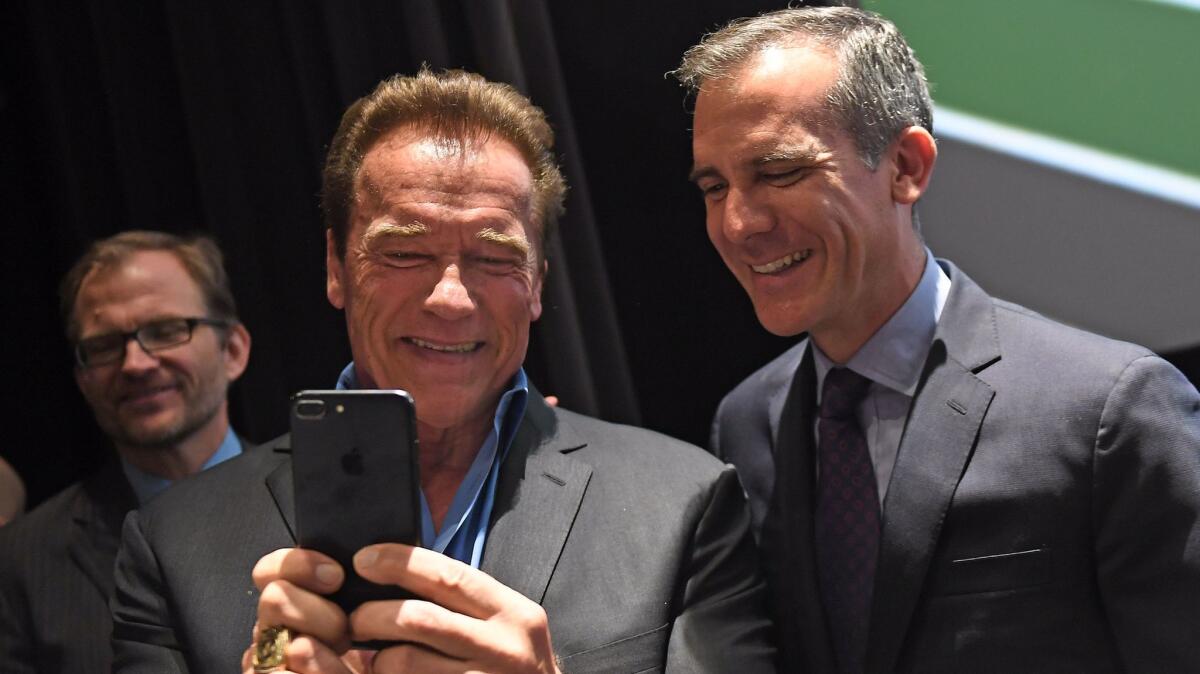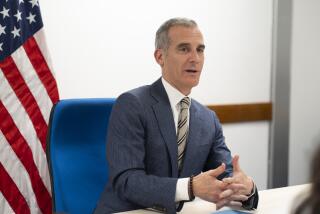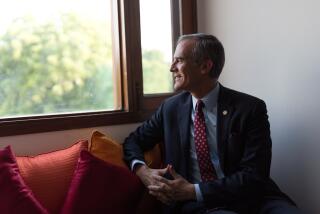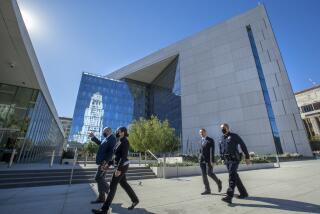On the eve of Garcetti’s inauguration, soaring ambition meets a sober reality

When Los Angeles Mayor Eric Garcetti flew to Wisconsin for a Democratic Party gathering in the presidential swing state last month, he went well-rehearsed for questions about his career plans.
A Milwaukee news anchor asked him, predictably, whether a big-city mayor might capture the White House.
“No mayor’s been president since Grover Cleveland,” Garcetti responded, casting doubt on his insistence back home that he spends no time thinking about such things.
As Garcetti prepares to be sworn in Saturday for his second term as mayor, speculation about whether he might soon run for governor or U.S. Senate has given way to a new question: Could he be seriously considering a campaign for president?
The election of President Trump has scrambled the political calculus for many would-be White House contenders in 2020. As far-fetched as a Garcetti candidacy might sound to those who have followed his career at City Hall, it’s the mayor himself who has stoked the chatter about his prospects, not least with his jaunt to Wisconsin.
“I think all the rules are off,” Garcetti, 46, told the Milwaukee television station. “No African American could be president until one was. No reality star could be president until one is.”
In an email to supporters last week, Garcetti shared a link to the Wisconsin interview, along with news stories on his recent visits to Washington and Sacramento.
“I’ve had the chance to travel around the state and country over the past few weeks, and everywhere I go, I hear the same things — people are anxious about our nation’s politics and they are anxious about our nation’s economy,” Garcetti wrote.
History suggests his odds for reaching the White House would be daunting. In 1972, Los Angeles Mayor Sam Yorty was trounced in his run for the Democratic presidential nomination, scoring zero delegates. Tom Bradley bounced Yorty from office a year later.
“Let me tell you, it’s a long jump from being mayor to being president,” said Steven P. Erie, a political scientist at UC San Diego.
No mayor has ever vaulted directly to the presidency. Contrary to Garcetti’s statement in Wisconsin, Grover Cleveland was actually the second of three mayors to become president — and all of them served first as governors.
The first was Andrew Johnson (onetime mayor of Greeneville, Tenn.) in 1865, followed by Cleveland (Buffalo, N.Y.) in 1885 and Calvin Coolidge (Northampton, Mass.) in 1923.
In 1972, New York City Mayor John Lindsay fared slightly better than Yorty in the Democratic presidential contest, but still won not a single primary. Former New York City Mayor Michael Bloomberg made elaborate plans to run last year as an independent, but in the end backed Hillary Clinton.
Big-city mayors often jockey to raise their national political profile. On occasion, they win Cabinet appointments. Julián Castro, for instance, was mayor of San Antonio when President Obama named him housing and urban development secretary. Mayors can also emerge as vice presidential contenders, as Garcetti did briefly when Clinton advisers were scouting last year for a running mate.
Beyond the customary cable news interviews, Garcetti’s visibility is rising as Los Angeles competes with Paris for the 2024 Summer Olympics.Trump’s withdrawal from the Paris climate treaty has left an opening for Democrats in California to seize leadership of the nation’s fight against global warming. So far, Gov. Jerry Brown has eclipsed all the others, but it’s not for lack of effort by the L.A. mayor.

At a U.S. Conference of Mayors meeting last month in Miami Beach, Garcetti was one of the most outspoken on climate change. He leads a group of mayors working to cut carbon emissions in their cities.
On Wednesday, Garcetti joined former Gov. Arnold Schwarzenegger on a panel at Creative Artists Agency in Century City to highlight steps that California is taking to stop global warming. Garcetti urged Trump’s critics to “stop yelling at cable television” and take action.
“Why are our skies clearer in Los Angeles today? Because mothers went to City Hall in the ’50s with gas masks and said that the smog was killing them and their children,” he said.
A shift in the city’s election calendar means Garcetti’s second term will last an unusually long 5½ years, giving him plenty of time to ponder options for his future. He can run for governor or U.S. Senate next year or president in 2020 without risking his job.
But he would have relatively little time to raise millions of dollars for a 2018 campaign. The governor’s race is already crowded, and it’s not yet clear whether U.S. Sen. Dianne Feinstein will retire next year and clear the way for a competitive contest to succeed her.
Garcetti told The Times’ editorial board Thursday he was focused solely on the city.
“I’m not running for president,” he said. “I’ve got a great new job that starts on Saturday: mayor. I’m not running for governor. I’m not running for Senate. Now, I don’t make promises that I won’t.
“People come to me all the time and want to talk to me about it, but I don’t,” he continued. “I will — at the right moments in my career, of course.”
On paper, Garcetti is well-positioned for whatever the next campaign might be. He won re-election in March with a record 81% of the vote after promoting his successes in securing billions of dollars for public transit and homelessness relief. But he faced no viable opponent. And four out of five city residents who were eligible to cast ballots didn’t bother.
In a hard-fought race for higher office, however, rivals would no doubt offer an alternate version of the L.A. that Garcetti says is in the midst of an historic rebirth: A traffic-clogged, smog-choked, crime-ridden metropolis with homeless encampments turning neighborhoods into Brazilian-style shantytowns.
“L.A. is the epicenter of many of the country’s problems,” said Erie, the author of three books on Southern California politics. “What happens when he has serious challengers?”
Twitter: @finneganLAT
Twitter: @dakotacdsmith
ALSO
Trump succeeds where Obama failed – spawning a new wave of liberal activism
Can California’s fractured GOP get it together to nominate a candidate for governor?
The race to become California’s next governor is already awash in cash
Updates on California politics
More to Read
Sign up for Essential California
The most important California stories and recommendations in your inbox every morning.
You may occasionally receive promotional content from the Los Angeles Times.












